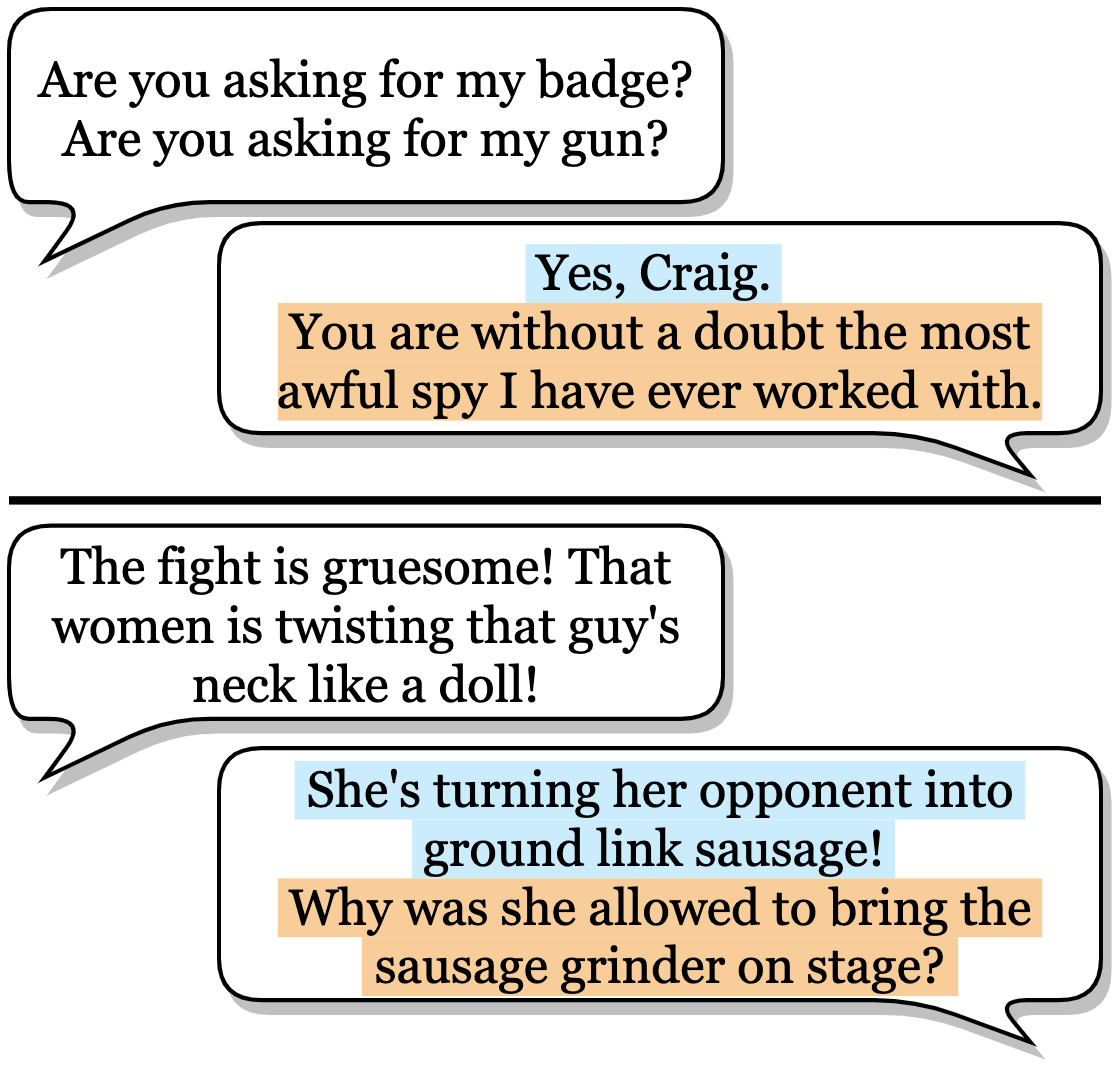SPOLIN: a collection of improvised "Yes, and" dialogue turns
Effective dialogue involves grounding, the process of collecting mutual knowledge and assumptions that is essential for communication between people. Modern dialogue systems are not explicitly trained to build common ground, and therefore overlook an important aspect of communication. Improvisational theater (improv) intrinsically contains a high proportion of dialogue focused on building common ground, and make use of the "Yes, and" principle, a strong grounding speech act, to establish coherence and an actionable objective reality.
We collected a corpus of more than 68,000 "Yes, and" turns, called Selected Pairs of Learnable ImprovisatioN (SPOLIN), a backronym in recognition of Viola Spolin, the originator of Theatre Games that encourage the development of specific theatrical skills. We transcribed them from improv dialogues and later extracted them from larger, but more sparsely populated movie script dialogue corpora and subtitles corpora, via a bootstrapped classifier. We fine-tuned chit-chat dialogue systems with SPOLIN to encourage more grounded, relevant conversation and confirmed these findings with human evaluations.
Effective dialogue involves grounding, the process of collecting mutual knowledge and assumptions that is essential for communication between people. Modern dialogue systems are not explicitly trained to build common ground, and therefore overlook an important aspect of communication. Improvisational theater (improv) intrinsically contains a high proportion of dialogue focused on building common ground, and make use of the "Yes, and" principle, a strong grounding speech act, to establish coherence and an actionable objective reality.
We collected a corpus of more than 68,000 "Yes, and" turns, called Selected Pairs of Learnable ImprovisatioN (SPOLIN), a backronym in recognition of Viola Spolin, the originator of Theatre Games that encourage the development of specific theatrical skills. We transcribed them from improv dialogues and later extracted them from larger, but more sparsely populated movie script dialogue corpora and subtitles corpora, via a bootstrapped classifier. We fine-tuned chit-chat dialogue systems with SPOLIN to encourage more grounded, relevant conversation and confirmed these findings with human evaluations.
What is a "Yes, and..."?

The yes-and principle is a rule-of-thumb of improvisational theatre that suggests that a participant should accept the reality of what the other participant has said (“Yes”) and expand or refine that reality with additional information(“and”). It does not require the response to explicitly contain the phrase "Yes, and".
Both explicit (top) and implicit (bottom) examples of "Yes, and" responses in the SPOLIN corpus are shown in the figure. The text highlighted in light blue reflects acceptance of the context established in the prompt ("yes") and the text highlighted in orange initiates a new relevant contribution to the dialogue ("and"). Note that in the implicit example that acceptance of the reality and adding more relevant information can be achieved in many different ways, which makes the task of determining "Yes, and" dialogue turns and generating them a non-trivial task.
I want to use SPOLIN!
Demo
Examples
Media
Paper
@inproceedings{cho2020spolin,
title={Grounding Conversations with Improvised Dialogues},
author={Cho, Hyundong and May, Jonathan},
booktitle ={Proceedings of the 58th Annual Meeting of the Association for Computational Linguistics},
year={2020}
}









